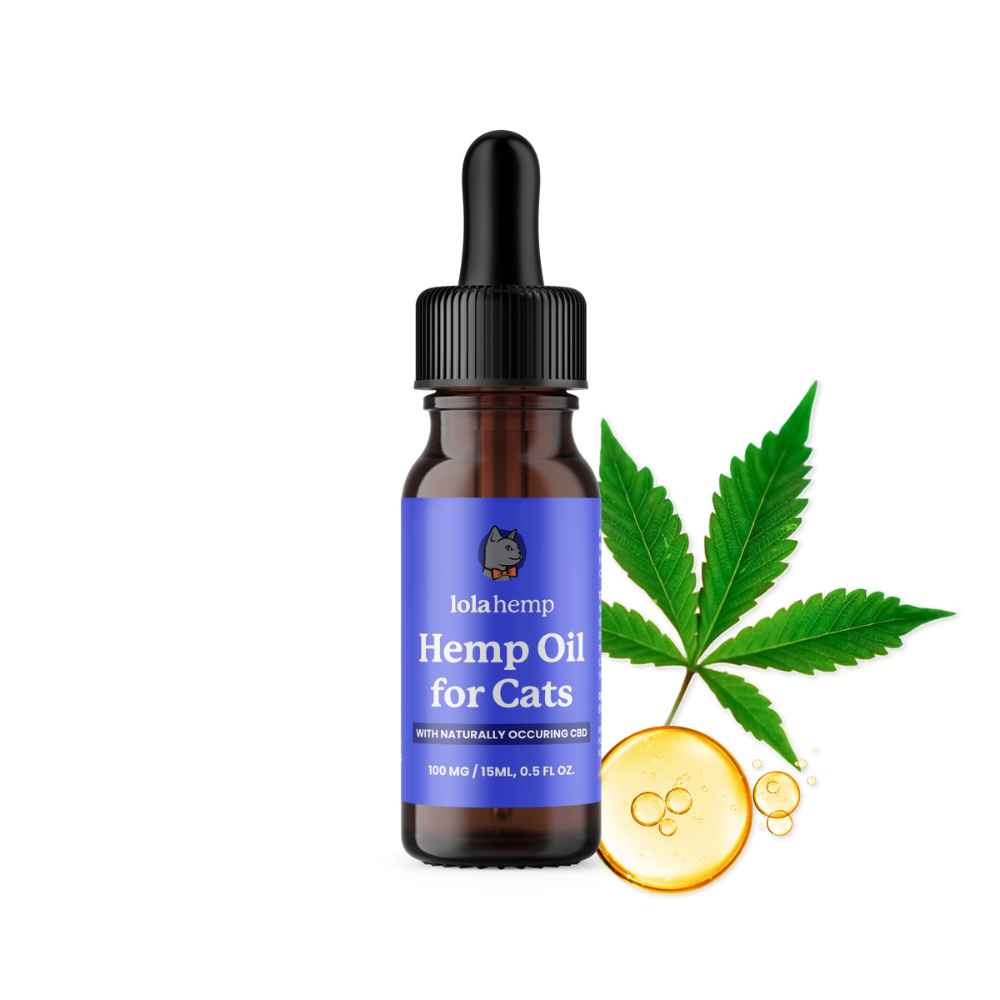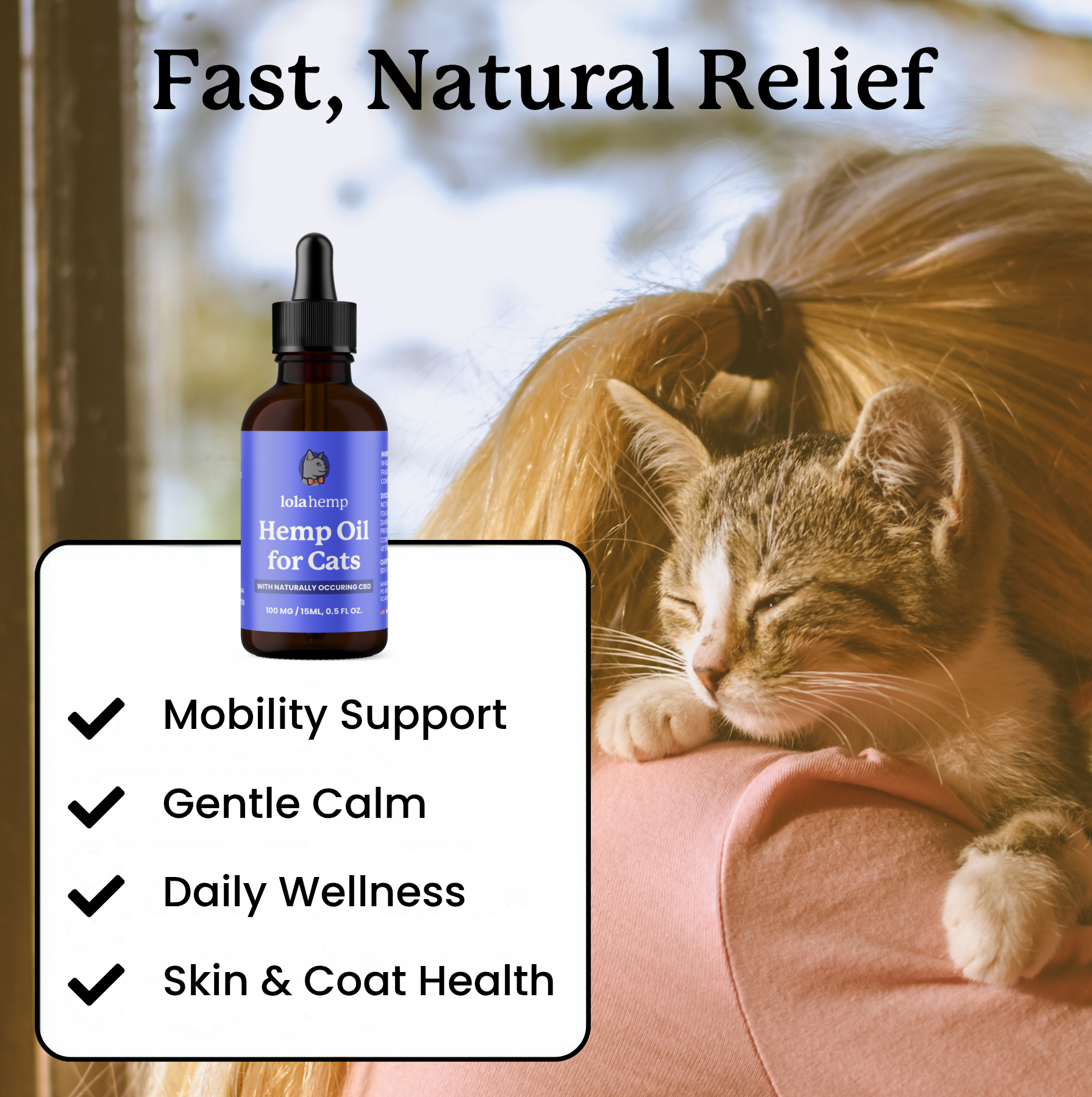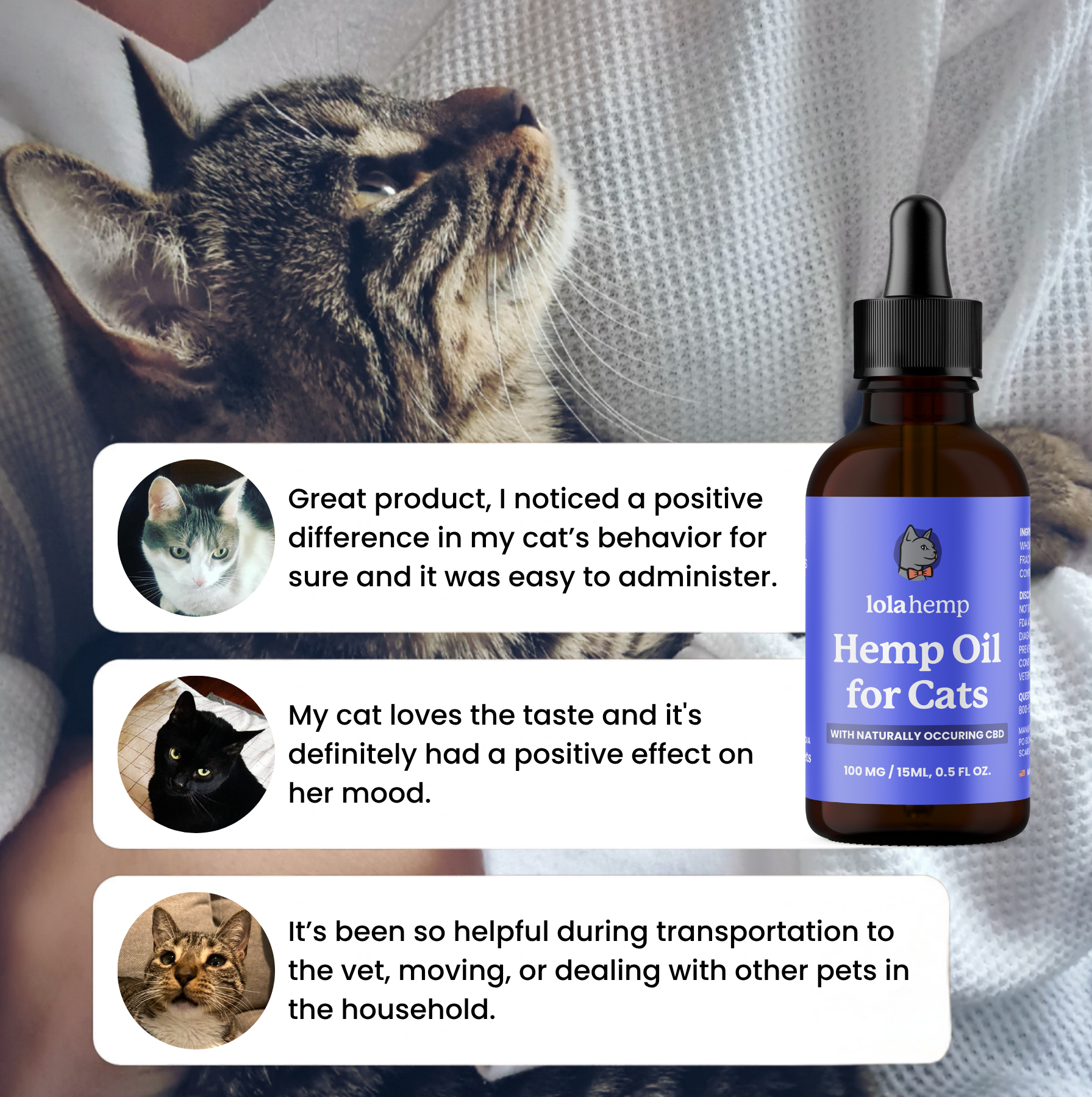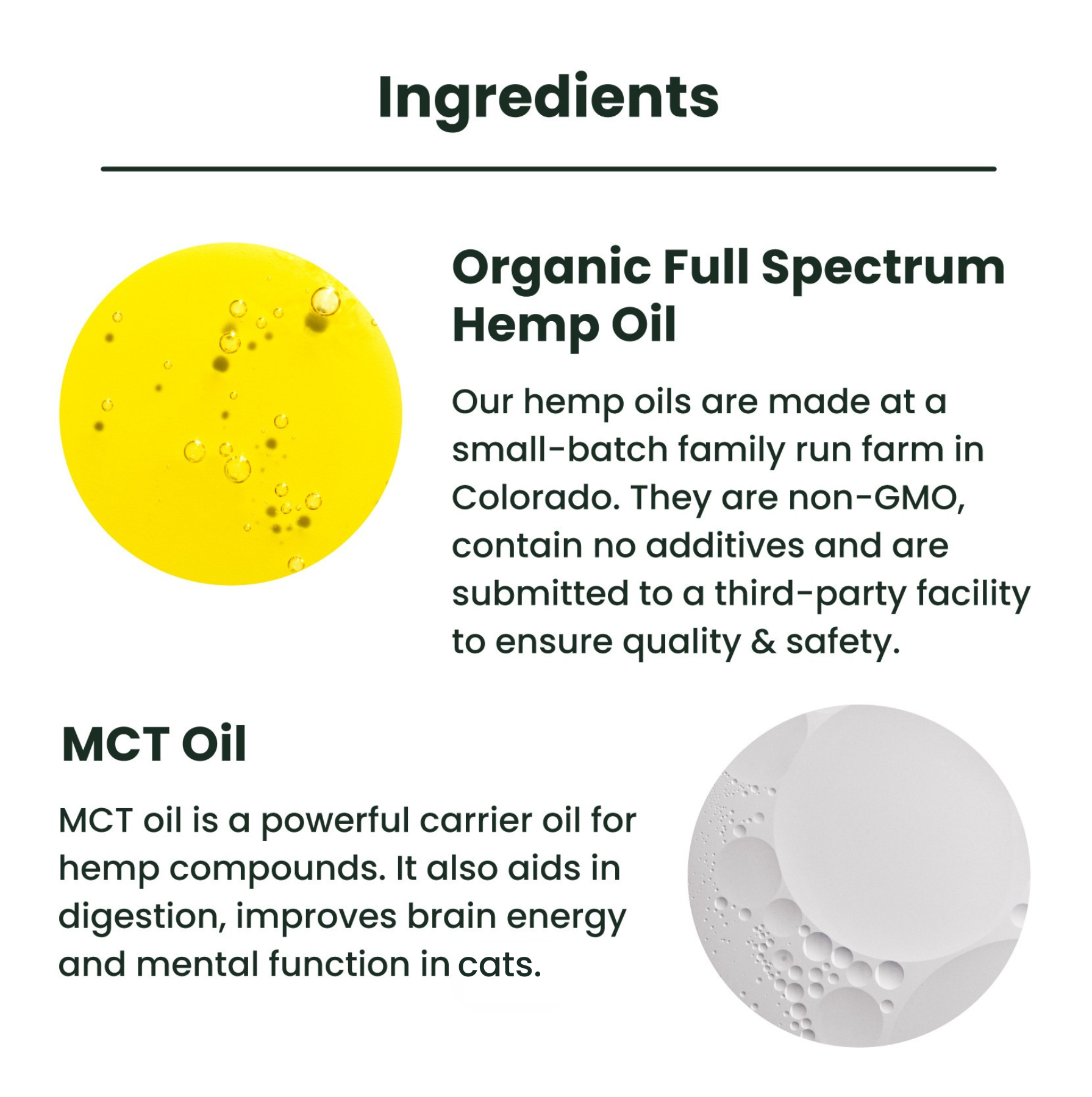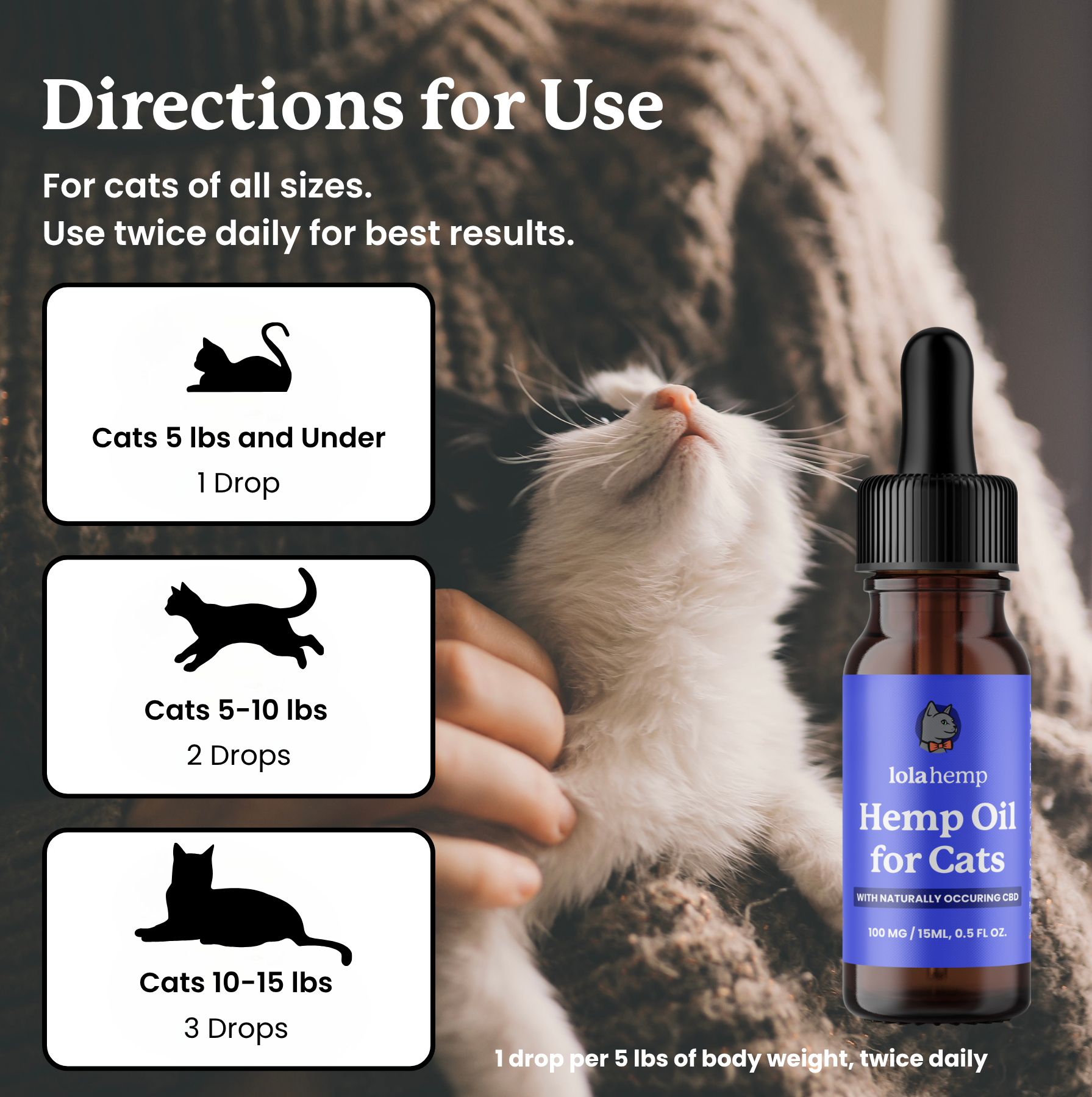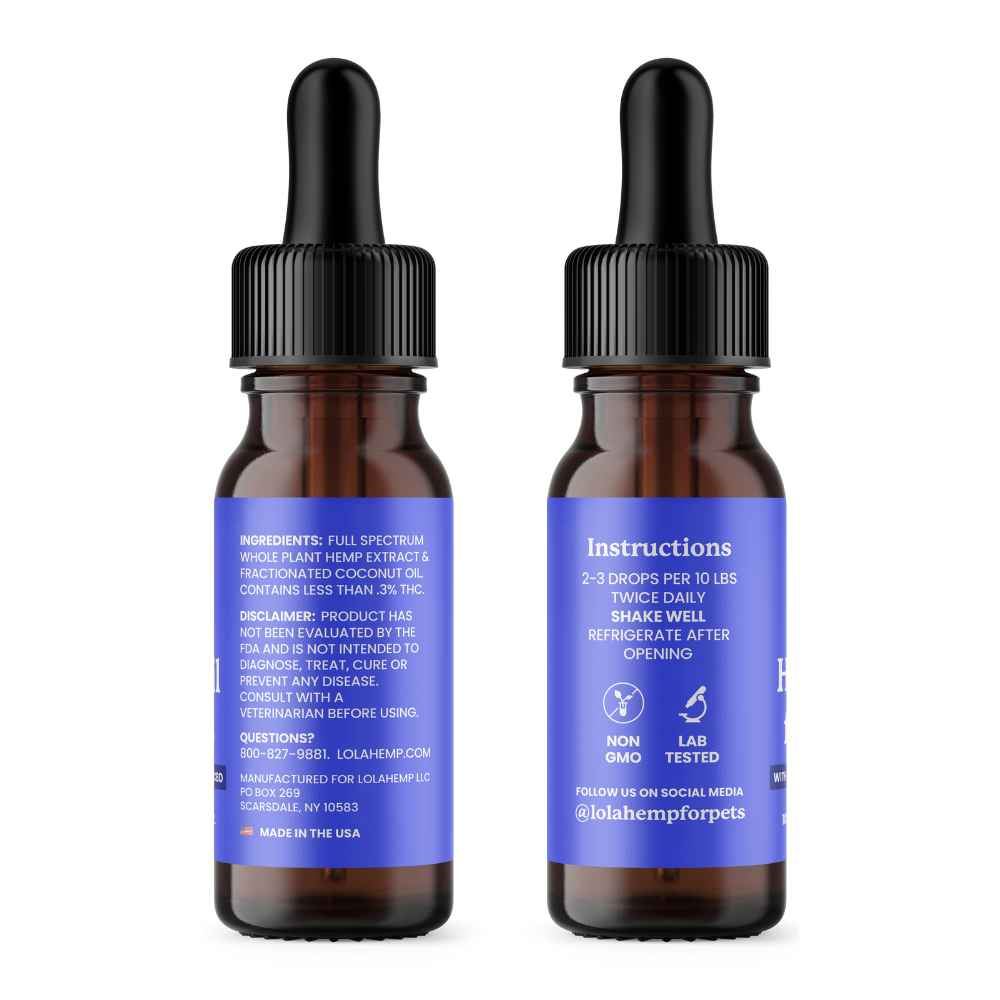Hemp oil is well-tolerated by healthy cats and may offer potential benefits for pain, anxiety, and overall well-being. Many cat owners have reported positive effects, but it’s important to note that results can vary between cats. Although generally considered safe, always consult with your vet before introducing hemp oil to your cat’s routine.
Let's learn more about the pros, cons, and use of hemp oil for our feline friends below.
- The Potential Benefits of Hemp Oil for Cats
- How Much Hemp Oil Should I Use for My Cat?
- Is Hemp Oil for Cats The Same as Hemp Oil for Humans?
- Finding Great Hemp Products for Your Cat
- Does Hemp Oil Interact with Feline Medications?
- Timeline of Results When Using Hemp Oil for Cats
- Conclusion
- Frequently Asked Questions About Is Hemp Oil Good for Cats?
The Potential Benefits of Hemp Oil for Cats
Hemp oil may be beneficial for cats experiencing:
- Physical discomfort
- Mobility challenges
- Emotional instability
- Overactivity
- Unexplained distress
- Lethargy
These are common issues cat owners address with hemp oil, but your veterinarian should be consulted to ensure it’s the right solution for your pet’s needs.
How Much Hemp Oil Should I Use for My Cat?
Proper dosing is essential when using hemp oil, as too much can cause drowsiness. Start with a low dose and adjust gradually.
A general guideline is 1mg of hemp oil per 10 lbs of body weight, twice daily. If you don’t see results, slightly increase the dose after a few weeks.
Hemp oil contains less than 0.3% THC, which is minimal and well-tolerated by cats at appropriate doses. Learn about THC risks for cats here.
Always follow dosage recommendations from the product manufacturer and your veterinarian.
Hemp Seed Oil vs Hemp Oil for Cats – What's the Difference?
-
Hemp Seed Oil: Derived from hemp seeds, it is rich in omega-3 fatty acids but lacks CBD, the compound responsible for many of hemp's health benefits. It’s beneficial for nutritional support, but consult with your vet about its suitability for your cat.
-
Hemp Oil (CBD Oil): Contains CBD and other cannabinoids, which interact with your cat’s endocannabinoid system to address various health concerns. For the best results, choose full-spectrum hemp oil, which includes a range of beneficial compounds from the hemp plant.

Is Hemp Oil for Cats The Same as Hemp Oil for Humans?
No! Do not give your cat CBD oil for human use because these products are formulated to be much stronger than CBD products for cats.
Cats are much smaller than humans, and they have different liver enzymes. This means that they process compounds differently, and certain compounds found in various products for humans may be toxic to cats.
Always use a CBD oil or hemp oil product that has been formulated for cats, specifically. Failing to do this can lead to issues with kidney function, negative side effects, or worse.
Finding Great Hemp Products for Your Cat
Always use a company that offers third party audit results for all of their products. A third party audit is also known as a lab test.
Trustworthy companies like Lolahemp offer third-party lab test results complete with certificates of authenticity. Further, look for a company that has a history of great results.
Many pet hemp companies don't have a long track record of success. Lolahemp has been in business for over 6 years, which is right around the time that hemp products with CBD became legal for pets.
Does Hemp Oil Interact with Feline Medications?
Your cat may be able to use hemp oil while on other medications, but it’s important to consult your veterinarian first.
CBD can interact with some medications, especially those processed by the liver, as it may alter how these drugs are metabolized. Your vet can determine the right dosage and monitor your cat for any side effects.
Here are some common medications that may interact with CBD:
- Anticonvulsants: Medications for seizures (e.g., phenobarbital) might not work as effectively with CBD.
- Antidepressants: CBD could affect how antidepressants function.
- Blood thinners: Drugs like warfarin may have increased effects when combined with CBD.
- Pain medications: CBD could alter the effects of opioids or NSAIDs.
- Anxiolytics: Benzodiazepines may interact with CBD.
Always prioritize your cat's safety and follow your vet's advice when using hemp oil alongside other medications.
Can My Cat Use Hemp Oil In Addition to Traditional Pain Relief Methods?
CBD can be safe for use alongside other pain management methods for cats, but it’s crucial to consult your veterinarian first.
CBD may complement traditional treatments by providing additional pain relief and reducing discomfort. However, because it can interact with certain medications, your vet can help determine the appropriate dosage and monitor your cat for any adverse effects. Always prioritize professional guidance when integrating CBD into your cat's pain management plan.
Can My Cat Use Hemp Oil in Addition to The Traditional Methods of Anxiety Relief?
Yes, CBD can be used in addition to traditional methods for managing cat anxiety. It may help enhance overall calmness and reduce symptoms.
However, it’s important to consult your veterinarian before combining CBD with other treatments. Your vet can advise on appropriate dosages and ensure that CBD won't interact negatively with any other medications or therapies your cat is receiving. Always prioritize your cat's safety and well-being by seeking professional guidance.

Timeline of Results When Using Hemp Oil for Cats
When using hemp oil (CBD oil) for cats, the timeline for seeing results can vary. Here's a breakdown of typical experiences:
-
Initial Assessment (1-2 Weeks): In the first one to two weeks, observe your cat for any changes. This period helps establish a baseline and allows you to determine if the dosage needs adjusting.
-
Noticeable Changes (2-4 Weeks): Many cat owners notice improvements in their cat’s emotional health, discomfort management, or overall well-being during this period.
-
Optimal Effects (4-8 Weeks): After four to eight weeks of consistent use, the full benefits of hemp oil are typically noticeable. Keep in touch with your vet for ongoing assessments.
-
Long-Term Management (8 Weeks and Beyond): After eight weeks, hemp oil may become part of your cat’s long-term health plan. Continue monitoring your cat’s response and discuss any changes with your vet.
Conclusion
Hemp oil can be beneficial for cats in managing various issues, including emotional distress, discomfort, and mobility challenges. While results can vary based on individual factors like age, weight, and health conditions, many cat owners report positive changes after a few weeks.
Always consult with your vet to ensure the proper dosage and monitor your cat’s health for the best results.
Frequently Asked Questions About Is Hemp Oil Good for Cats?
Is hemp oil safe for cats?
Hemp oil is generally well-tolerated by healthy cats, but you should always consult your veterinarian before use.
Can hemp oil help with my cat’s anxiety?
Many cat owners report that hemp oil helps support calmness, but results vary and should be monitored with guidance from your vet.
How much hemp oil should I give my cat?
A typical guideline is 1mg of hemp oil per 10 lbs of body weight, but always follow your vet’s dosing recommendations.
Can cats use human hemp oil products?
No. Human hemp oil products may be too strong or contain ingredients unsafe for cats. Use only cat-formulated products.
Does hemp oil interact with cat medications?
Yes. Hemp oil may interact with certain medications, especially those processed by the liver, so consult your vet first.

